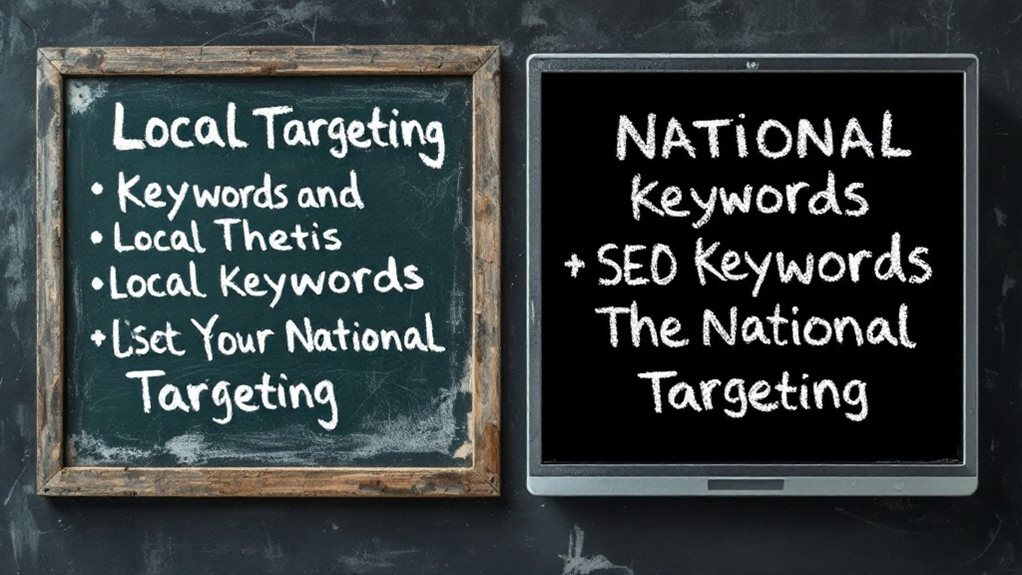Local keywords focus on your specific location and have less competition but lower search volumes. National keywords target broader industry terms, with higher competition but higher search volumes. Local SEO prioritizes personalized customer engagement, while national SEO requires more resources for broader keyword competition. Your business model and customer search intent should determine whether you target local, national, or a hybrid approach. Dive deeper to learn how these differences impact your SEO strategy and results.
Keyword Targeting Differences

When it comes to keyword targeting, the differences between local and national SEO strategies are quite apparent. Local keywords often focus on location-specific services, like "plumber in San Francisco," while national keywords target broader industry terms, such as "home plumbing services." Local keywords have less competition compared to national keywords. Local keywords are more specific and have lower search volumes, making them less competitive but more effective for immediate customer engagement. In contrast, national keywords generally have higher competition due to broader applicability, requiring ranking among thousands of businesses nationwide. Geographical targeting is essential for local SEO, whereas national SEO involves selecting keywords that span a wide geographic area.
SEO Strategy Variations

While the foundations of SEO strategy remain consistent, the variations between local and national approaches can significantly impact your campaign's effectiveness. For local SEO, you'll need to prioritize content tailored to specific regions, personalized customer engagement, and building local backlinks. In contrast, national SEO requires more extensive resources for broader keyword competition, including a larger team, higher budgets, and advanced tools. Understanding the differences between local and national keywords is crucial for developing a comprehensive SEO strategy. Ultimately, a hybrid approach that combines local and national tactics may be most beneficial, allowing you to target diverse customer segments and expand your geographic reach over time. Adapt your strategies based on comprehensive competitive analyses to stay ahead in dynamic markets.
Business Model Suitability

Local keywords are well-suited for small businesses with a physical presence, as they can drive immediate foot traffic and sales. Google Trends can help identify the most popular local keywords for your business. In contrast, national keywords are more suitable for larger companies, e-commerce sites, and businesses not tied to a specific location, offering a broader reach and growth potential. Understand your business model to determine the right keyword strategy that aligns with your objectives and target audience.
Fit for Small Firms
As a small firm, local keywords are particularly well-suited to your business model. They allow you to compete effectively with larger national players by focusing on your specific geographic area. With lower resource requirements compared to national campaigns, local SEO is a cost-efficient way for you to establish your business as an expert in your community. Documenting research and following quality standards enables responsive content creation. Local searches often have higher conversion rates due to immediate buying intent, and you can tailor your content to resonate with your target audience. Additionally, the flexibility of local SEO enables you to quickly adapt to changing customer preferences or economic conditions in your area, giving you a strategic advantage.
Suitability for Large Businesses
National SEO is better suited for large businesses seeking to target a broader audience across vast geographical areas. With national keywords, you can reach customers nationwide or even globally, making it ideal for organizations with diverse market interests. The broader, non-location-specific keywords used in national SEO allow for more adaptable business models, as you're less constrained by geographical limitations. Additionally, the content strategy focuses on appealing to a wide audience, and the competition levels are generally lower than in local SEO, providing you a competitive edge. The flexibility of national SEO enables large businesses to effectively scale their operations and cater to a wider range of customer demographics.
| Key Differences | National SEO | Local SEO |
|---|---|---|
| Keyword Strategy | Broader, non-location-specific | Hyper-targeted, location-specific |
| Content Strategy | Generic, appeals to wide audience | Tailored to local interests |
| Competition Level | Generally lower | Higher in specific localities |
| Business Model Flexibility | More adaptable | Tied to geographical constraints |
E-commerce Relevance
How relevant are local and national keywords to your e-commerce business model? Local keywords are essential if you have physical locations or target specific regions. These keywords improve visibility for “near me” searches, helping you attract nearby customers. Optimizing your content and Google Business Profile with local keywords can boost your local search rankings. Customer reviews from local customers also enhance your credibility. For e-commerce without a physical presence, national keywords are more suitable, allowing you to reach a broader audience. [Segmenting your marketing efforts geographically and tracking metrics like search rankings and website traffic can help analyze the performance of both local and national keyword strategies.] However, e-commerce platforms can leverage both strategies by segmenting their marketing efforts geographically, tracking metrics like search rankings and website traffic to analyze performance.
Search Query Intent Disparities
You'll find that local searchers often rely on mobile devices and prioritize immediate action, like booking an appointment or placing an order. This mobile-first, action-oriented mindset contrasts with the broader, more research-driven intent of national keyword searches. Keywords help businesses optimize their content to match user queries. Understanding these differences in user behavior and intent is crucial for crafting effective search strategies that cater to both local and national audiences.
Mobile Device Preference
The increasing dominance of mobile device usage has significantly impacted search query intent disparities. Mobile users often seek quick, location-specific information, focusing on queries like "best pizza near me." This contrasts with desktop searches, which tend to be more exploratory and navigational. Additionally, mobile queries may be driven by contextual factors, like time of day and emotional needs, rather than just informational or transactional intent. Implicit search intent plays a key role in understanding these mobile-specific search behaviors. Optimizing for these mobile-specific search behaviors requires understanding micro-moments, leveraging location services, and classifying queries by intent. Adapting SEO strategies to accommodate mobile device preferences is crucial for maintaining strong search rankings across all platforms.
Immediate Action Orientation
One of the key differences between local and national search queries lies in their immediate action orientation. Local searches often have more specific, geographically-focused intent – queries may include "near me" or location names, and results often feature Google Maps integration and sponsored local deals. Satisfying passive intent is essential for user engagement and conversion. In contrast, national searches tend to be broader, with a focus on general product or service information rather than immediate transactional needs. Informational content is frequently prioritized over direct calls-to-action. Understanding these intent-level differences is crucial for aligning your content and SEO strategies to deliver the most relevant, actionable results for users, whether they're seeking local or national solutions.
Performance Metric Distinctions
Tracking performance metrics is crucial for both local and national SEO strategies, as they provide valuable insights into the effectiveness of your optimization efforts. For local SEO, focus on location-based traffic, conversion rate, local backlink quality, Google My Business engagement, and keyword ranking for local intent. Local SEO is a strategy that focuses on optimizing online presence to increase local visibility and attract more customers. In contrast, national SEO metrics should encompass total organic traffic, brand visibility across platforms, competitor ranking comparison, long-tail keyword performance, and average position in search results. To monitor these metrics, leverage tools like Google Analytics, SEMrush, Ahrefs, Rank Tracker, Google My Business Insights, and social media analytics. By understanding the distinctions between local and national performance indicators, you can refine your strategies and drive meaningful results.
Economic and Competitive Factors
Beyond the performance metrics, the economic factors underlying local and national SEO strategies are equally vital to consider. Local SEO often targets community needs and growth opportunities at a lower cost compared to national efforts. Meanwhile, local businesses contribute more directly to economic development through community involvement. They can even benefit from government incentives for digital expansion. This translates to increased foot traffic and customer spending. Conversely, national SEO faces higher competition from larger brands, but trends are less volatile. The competitive landscape is more manageable for local SEO, allowing businesses to differentiate themselves within a smaller market.
Geographic Optimization Considerations
Creating localized content tailored to specific geographic areas can significantly boost your online visibility. Ensure your business listings are accurate and up-to-date across hyper-local directories to improve proximity-based ranking factors. Analyze how your competitors are leveraging geographic keywords to inform your own optimization strategy.
Localized Content Creation
How can you leverage localized content creation to optimize for geographic-specific search intent? By seamlessly integrating local keywords, you can increase content relevance and attract qualified leads. Incorporate regional slang, dialects, and cultural references to foster a deeper connection with your local audience. Create landing pages tailored to specific locations, featuring localized keywords, images, and customer testimonials. Partner with influential local figures to add authenticity and tap into their community relationships. Actively engage on social media, offering multi-language support, and customize calls-to-action for optimal conversion. Localized content creation demonstrates your commitment to serving the unique needs of your geographic markets, giving you a competitive edge.
Proximity-Based Ranking Factors
Since proximity is a key factor in local SEO, you'll want to understand how it impacts your rankings. Google uses proximity to prioritize businesses based on distance, especially for "near me" searches. In populated areas, your visibility increases due to higher demand. Easy-to-reach locations boost rankings by encouraging more customers and reviews. Businesses closer to area centers rank higher for related searches. In urban areas, Google favors very close businesses, while in rural areas, it may show ones further away. Your ranking can also vary based on search volume, competition, and local infrastructure.
Hyper-Local Directory Listings
What are hyper-local directory listings, and why do they matter for your business? Hyper-local listings focus on specific geographic areas, helping you increase visibility to local customers actively seeking your services. These listings on platforms like Google My Business and Yelp feature accurate business info, reviews, and location-based keywords – boosting your local credibility and engagement. Consistent listings across directories enhance trust, impact SEO rankings, and project a professional brand image. Optimizing your content with geo-targeted keywords, high-quality descriptions, and visuals further improves your local search visibility and map pack inclusion. Leveraging hyper-local listings as part of your broader SEO strategy is crucial for multi-location businesses to maximize their online presence in each target market.
Content Creation Approaches
When it comes to content creation, you'll need to take a strategic approach that caters to both local and national audiences. Understand that local content targets specific geographic areas, while national content appeals to a broader audience. Leverage keyword research tools to identify the right keywords for each audience. Use long-tail, location-specific keywords for local content to reduce competition. Analyze your competitors' strategies and tailor your content to match search intent. Optimize your content for SEO, ensuring it's mobile-friendly and features local elements. Design user-centric content and monitor engagement metrics to refine your approach. By addressing the unique needs of local and national audiences, you can deliver impactful content that resonates with your target markets.
Backlink Acquisition Strategies
Crafting an effective backlink acquisition strategy is paramount for amplifying your SEO efforts. Leverage linkable assets like informative content, free tools, and original research to attract natural backlinks. Prioritize links from high-authority, relevant domains to boost your domain authority. Implement strategic techniques like broken link building, image link building, and niche edits to secure valuable backlinks. Consistently publish quality content and engage with your audience on social media and forums to cultivate meaningful relationships for future link opportunities. Avoid spammy or low-quality links that could harm your SEO. By mastering these backlink acquisition strategies, you'll strengthen your online presence and climb the search engine rankings.
Algorithm-Based Ranking Factors
The algorithm that powers search engines is a complex and multifaceted beast, considering over 200 factors for ranking websites. Quality content, keyword relevance, and user interaction are key drivers for both local and national SEO success.
To optimize your rankings, focus on these three crucial elements:
- Ensure your content is informative, relevant, and tailored to your target audience's search intent.
- Strategically incorporate keywords that align with what users are searching for.
- Monitor and improve your website's user interaction metrics, such as click-through rate and bounce rate.
Mastering these algorithm-based ranking factors is essential for outranking your competition, whether you're targeting local or national markets.
